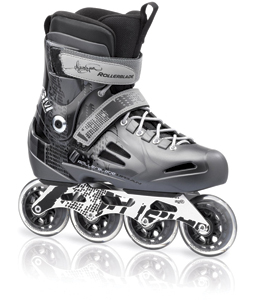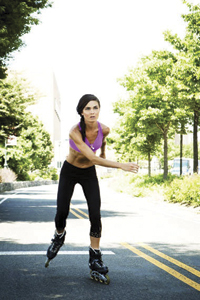BY TRACY HOUSE
Remember when roller skates were adjustable metal plates you strapped onto your shoes? The metal wheels scraped across the sidewalk, and you were never allowed to wear them in the house.
Or what about going to the roller rink on Friday nights? The music blared and the strobe lights flashed as you and your friends skated around and around the rink, dancing to the beat and trying not to get knocked over.
Today, roller rinks still blare and flash for Friday night skate parties, but now the skates have eight wheels and are inline.
In style
Sleek new designs and twenty-first century technology have added new dimensions to skating. Roller skate wheels were originally made from metal, wood, or ivory, but today’s inline skate wheels are made of urethane. This plastic material can be made into harder or softer wheels for specific surfaces, and come in different sizes for various types of skating. The larger the wheel the faster you go.
Wheel size is important, and depends on the type of inline skating you’re doing─aggressive, hockey, recreational, speed and fitness inline skating all require different sizes. Whichever style of inline skating you choose, proper equipment including helmet, knee and elbow pads, and wrist guards, will make for a smoother, safer experience that enables you to fully appreciate the rewards of inline skating.
In shape
Who would have thought that all those circles around the rink were more than just a fun way to hang out with friends and listen to music? Inline skating is a low-impact exercise that can burn up to 280 calories in 30 minutes─the faster you go the more calories you burn. Inline skating also strengthens hamstring, thigh, and hip muscles.
Health benefits are not the only advantage of inline skating.
Half of American commuters travel less than five miles to work. Inline skating not only provides an opportunity for commuters to get some exercise on the way to work, but also is another alternative to walking or biking that can save money and reduce your carbon footprint. That’s a benefit everyone can appreciate.

Into the ride
Get in shape and go green while experiencing the natural beauty of Arizona. Where there’s asphalt or concrete, there’s a place for inline skating. Scenic trails throughout Arizona provide a picturesque route for inline skaters to enjoy while reaping all the health and eco-friendly benefits.
Indian Bend Wash Trail in Scottsdale, Hillcrest Canal Trail in Glendale, and Salt River Trail in Tempe are just a few of the trails in Arizona. Community paths through parks and around ponds provide another option for skaters, and are often found closer to home.
Several Valley cities have skate parks that provide a more adventurous skating experience-including ramps, jumps and rails. Tucson, Gilbert, Phoenix, Chandler, and Scottsdale boast skate parks for all levels of ability with various features for beginners and advanced skaters. Visit pvgrind.com or concretedisciples.com or skatecompass.com to view the skate parks available in your city.
And if you’re not quite ready to skate the pavement, roller rinks are a great option. Tucson, Glendale, Phoenix, Chandler, Mesa and Peoria have indoor rinks that are family friendly, complete with music and flashing lights, and you get to go around and around. So slip your feet into a pair of inline skates and enjoy the ride.
In the know
• Almost 4 million people frequently participate in inline skating in the United States, making it a popular recreational sport.
• While inline skating is not yet part of the Olympic Games, speed roller skating and inline roller hockey will be featured at The World Games 2013 in Cali, Colombia.
• While injury is possible in any sport, inline skating results in only half the injuries of an active team sport such as soccer, basketball, or football.
• Wrist injuries account for 24 percent of inline skating injuries─something that can be minimized by wearing wrist guards.
• Rollerblade, Inc. is a trademark name of inline skates that has become synonymous with the term rollerblading. Rollerblade, Inc. makes inline skates, however not all inline skates are rollerblades.
• John Joseph Merlin is credited with fashioning the first roller skate in the 1700s.
• Inline skates range in price from $35 – $1,000. Choose a pair that is in your budget and provides the quality you are looking for in a pair of inline skates.
Sources
Inline Skating Resource Center
www.iisa.org
Rollerblade, Inc.
www.rollerblade.com
International World Games Association
www.theworldgames.org
Trail Link
www.traillink.com








